Adaptation of Learning Behaviour in International Students at KOI
VerifiedAdded on 2022/08/31
|32
|9520
|17
Report
AI Summary
This research report delves into the adaptation of learning behaviors among international students at Kings Own Institute (KOI) in Australia. The study explores the challenges and experiences of students from Nepal and Japan, examining factors impacting their learning transitions and the educational systems of their home countries compared to Australia. The research aims to identify how international students meet their learning requirements in Australia and how KOI can improve its academic services to support them. The report includes a literature review, research methodology with qualitative data collection, and a discussion of the research questions, objectives, and justification, offering recommendations for KOI to enhance its services and address cultural and language barriers. The research also highlights the benefits of cross-cultural awareness and its impact on policy and educational consistency.
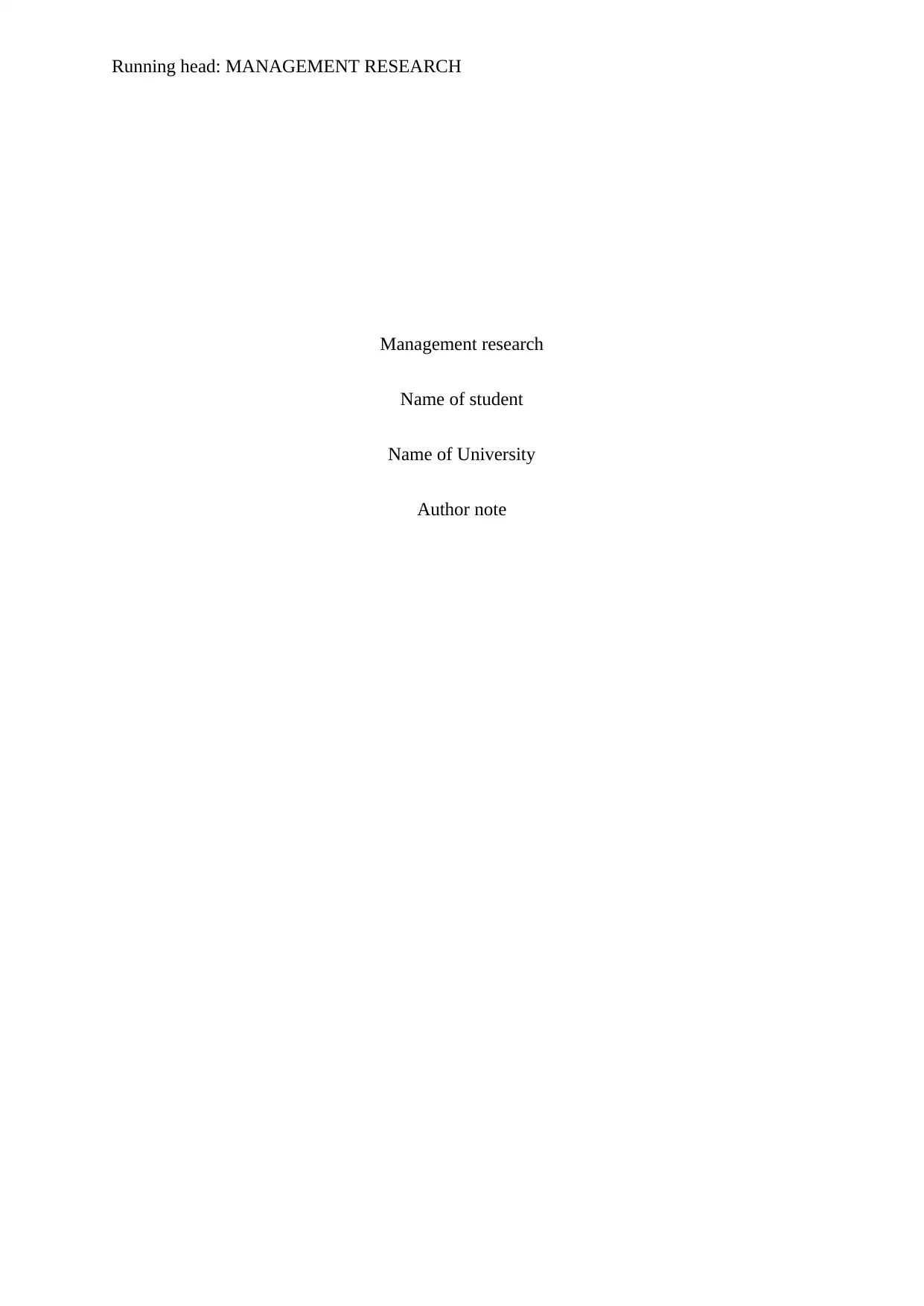
Running head: MANAGEMENT RESEARCH
Management research
Name of student
Name of University
Author note
Management research
Name of student
Name of University
Author note
Paraphrase This Document
Need a fresh take? Get an instant paraphrase of this document with our AI Paraphraser
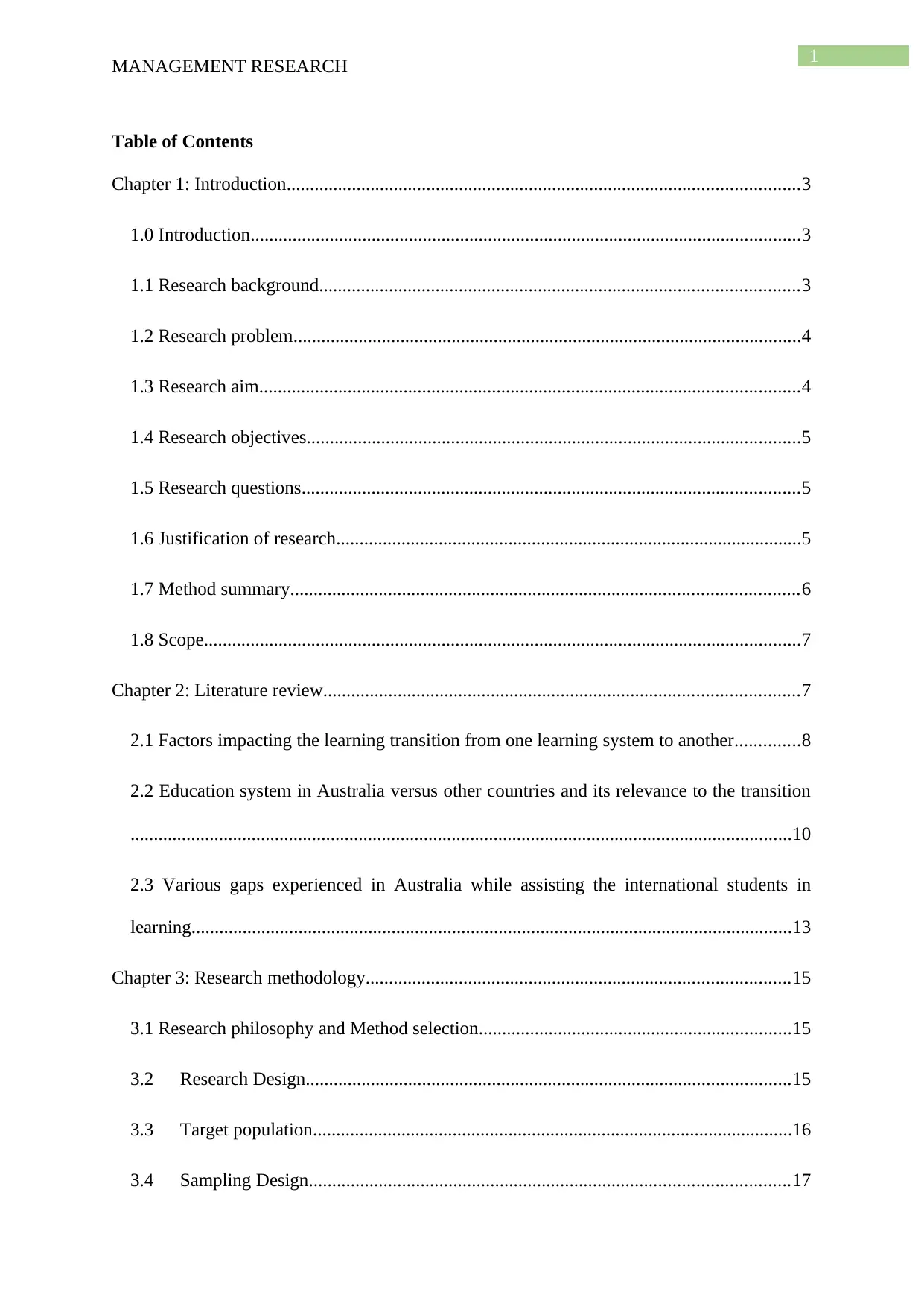
1
MANAGEMENT RESEARCH
Table of Contents
Chapter 1: Introduction..............................................................................................................3
1.0 Introduction......................................................................................................................3
1.1 Research background.......................................................................................................3
1.2 Research problem.............................................................................................................4
1.3 Research aim....................................................................................................................4
1.4 Research objectives..........................................................................................................5
1.5 Research questions...........................................................................................................5
1.6 Justification of research....................................................................................................5
1.7 Method summary.............................................................................................................6
1.8 Scope................................................................................................................................7
Chapter 2: Literature review......................................................................................................7
2.1 Factors impacting the learning transition from one learning system to another..............8
2.2 Education system in Australia versus other countries and its relevance to the transition
..............................................................................................................................................10
2.3 Various gaps experienced in Australia while assisting the international students in
learning.................................................................................................................................13
Chapter 3: Research methodology...........................................................................................15
3.1 Research philosophy and Method selection...................................................................15
3.2 Research Design........................................................................................................15
3.3 Target population.......................................................................................................16
3.4 Sampling Design.......................................................................................................17
MANAGEMENT RESEARCH
Table of Contents
Chapter 1: Introduction..............................................................................................................3
1.0 Introduction......................................................................................................................3
1.1 Research background.......................................................................................................3
1.2 Research problem.............................................................................................................4
1.3 Research aim....................................................................................................................4
1.4 Research objectives..........................................................................................................5
1.5 Research questions...........................................................................................................5
1.6 Justification of research....................................................................................................5
1.7 Method summary.............................................................................................................6
1.8 Scope................................................................................................................................7
Chapter 2: Literature review......................................................................................................7
2.1 Factors impacting the learning transition from one learning system to another..............8
2.2 Education system in Australia versus other countries and its relevance to the transition
..............................................................................................................................................10
2.3 Various gaps experienced in Australia while assisting the international students in
learning.................................................................................................................................13
Chapter 3: Research methodology...........................................................................................15
3.1 Research philosophy and Method selection...................................................................15
3.2 Research Design........................................................................................................15
3.3 Target population.......................................................................................................16
3.4 Sampling Design.......................................................................................................17
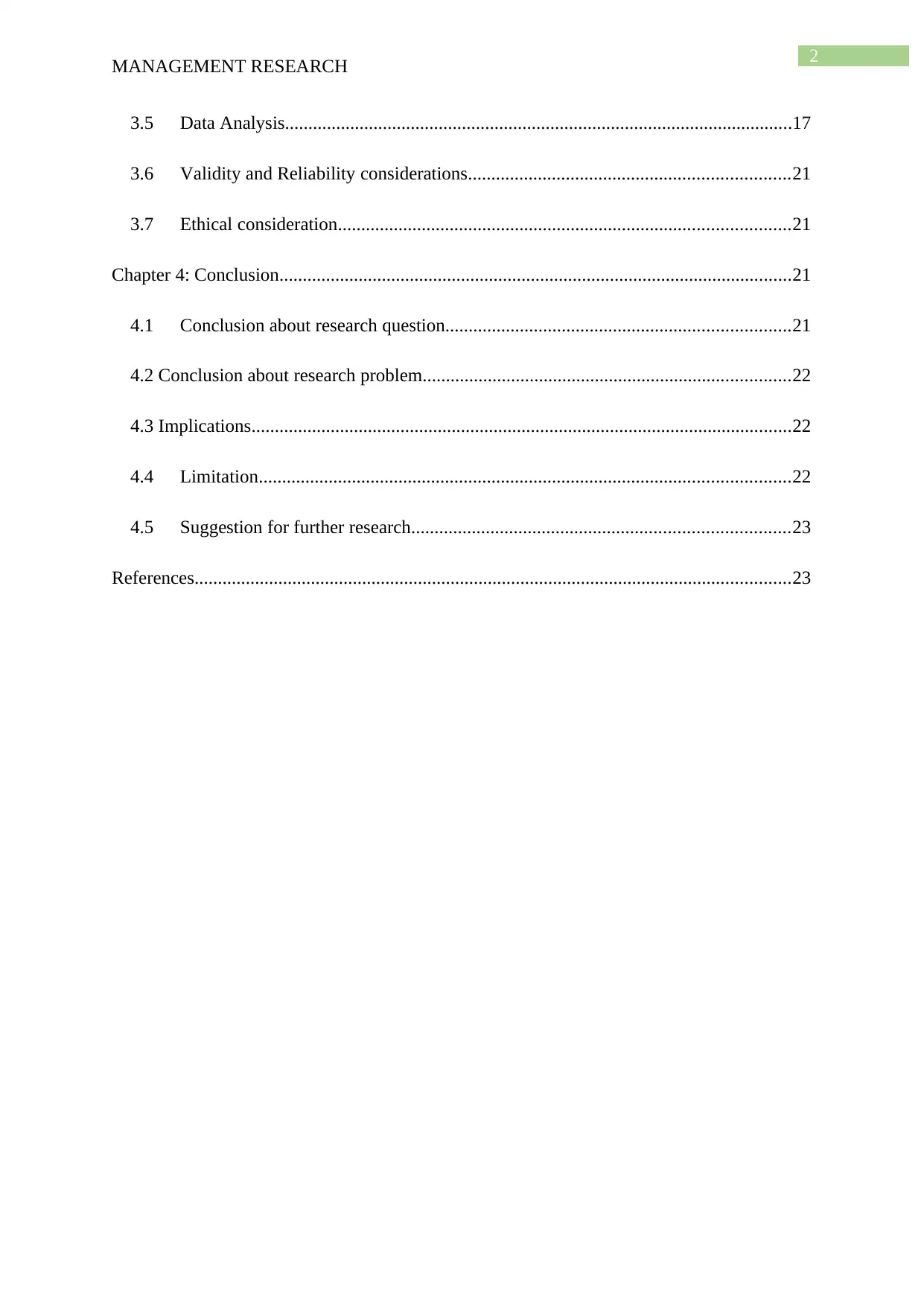
2
MANAGEMENT RESEARCH
3.5 Data Analysis.............................................................................................................17
3.6 Validity and Reliability considerations.....................................................................21
3.7 Ethical consideration.................................................................................................21
Chapter 4: Conclusion..............................................................................................................21
4.1 Conclusion about research question..........................................................................21
4.2 Conclusion about research problem...............................................................................22
4.3 Implications....................................................................................................................22
4.4 Limitation..................................................................................................................22
4.5 Suggestion for further research.................................................................................23
References................................................................................................................................23
MANAGEMENT RESEARCH
3.5 Data Analysis.............................................................................................................17
3.6 Validity and Reliability considerations.....................................................................21
3.7 Ethical consideration.................................................................................................21
Chapter 4: Conclusion..............................................................................................................21
4.1 Conclusion about research question..........................................................................21
4.2 Conclusion about research problem...............................................................................22
4.3 Implications....................................................................................................................22
4.4 Limitation..................................................................................................................22
4.5 Suggestion for further research.................................................................................23
References................................................................................................................................23
⊘ This is a preview!⊘
Do you want full access?
Subscribe today to unlock all pages.

Trusted by 1+ million students worldwide
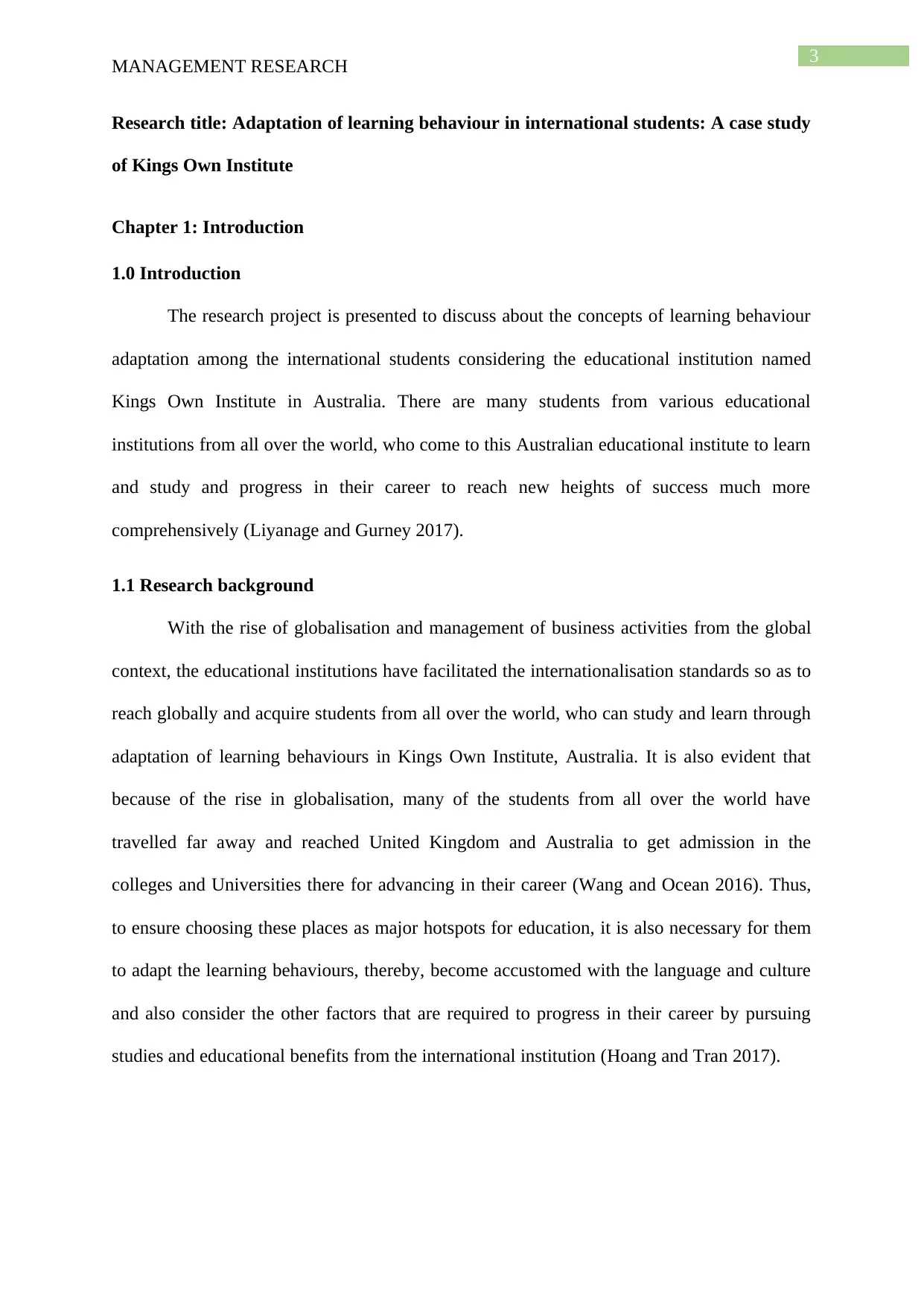
3
MANAGEMENT RESEARCH
Research title: Adaptation of learning behaviour in international students: A case study
of Kings Own Institute
Chapter 1: Introduction
1.0 Introduction
The research project is presented to discuss about the concepts of learning behaviour
adaptation among the international students considering the educational institution named
Kings Own Institute in Australia. There are many students from various educational
institutions from all over the world, who come to this Australian educational institute to learn
and study and progress in their career to reach new heights of success much more
comprehensively (Liyanage and Gurney 2017).
1.1 Research background
With the rise of globalisation and management of business activities from the global
context, the educational institutions have facilitated the internationalisation standards so as to
reach globally and acquire students from all over the world, who can study and learn through
adaptation of learning behaviours in Kings Own Institute, Australia. It is also evident that
because of the rise in globalisation, many of the students from all over the world have
travelled far away and reached United Kingdom and Australia to get admission in the
colleges and Universities there for advancing in their career (Wang and Ocean 2016). Thus,
to ensure choosing these places as major hotspots for education, it is also necessary for them
to adapt the learning behaviours, thereby, become accustomed with the language and culture
and also consider the other factors that are required to progress in their career by pursuing
studies and educational benefits from the international institution (Hoang and Tran 2017).
MANAGEMENT RESEARCH
Research title: Adaptation of learning behaviour in international students: A case study
of Kings Own Institute
Chapter 1: Introduction
1.0 Introduction
The research project is presented to discuss about the concepts of learning behaviour
adaptation among the international students considering the educational institution named
Kings Own Institute in Australia. There are many students from various educational
institutions from all over the world, who come to this Australian educational institute to learn
and study and progress in their career to reach new heights of success much more
comprehensively (Liyanage and Gurney 2017).
1.1 Research background
With the rise of globalisation and management of business activities from the global
context, the educational institutions have facilitated the internationalisation standards so as to
reach globally and acquire students from all over the world, who can study and learn through
adaptation of learning behaviours in Kings Own Institute, Australia. It is also evident that
because of the rise in globalisation, many of the students from all over the world have
travelled far away and reached United Kingdom and Australia to get admission in the
colleges and Universities there for advancing in their career (Wang and Ocean 2016). Thus,
to ensure choosing these places as major hotspots for education, it is also necessary for them
to adapt the learning behaviours, thereby, become accustomed with the language and culture
and also consider the other factors that are required to progress in their career by pursuing
studies and educational benefits from the international institution (Hoang and Tran 2017).
Paraphrase This Document
Need a fresh take? Get an instant paraphrase of this document with our AI Paraphraser
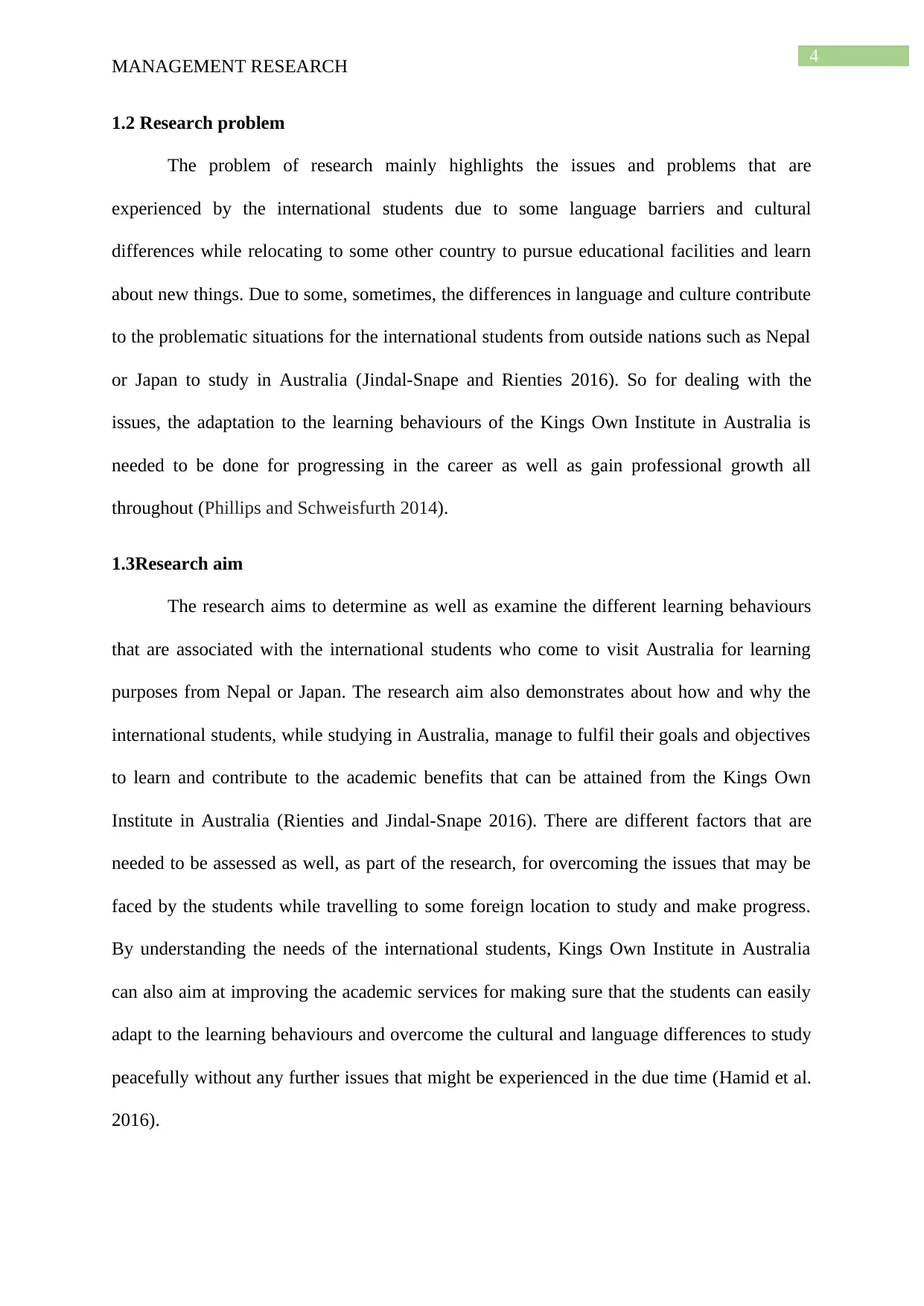
4
MANAGEMENT RESEARCH
1.2 Research problem
The problem of research mainly highlights the issues and problems that are
experienced by the international students due to some language barriers and cultural
differences while relocating to some other country to pursue educational facilities and learn
about new things. Due to some, sometimes, the differences in language and culture contribute
to the problematic situations for the international students from outside nations such as Nepal
or Japan to study in Australia (Jindal-Snape and Rienties 2016). So for dealing with the
issues, the adaptation to the learning behaviours of the Kings Own Institute in Australia is
needed to be done for progressing in the career as well as gain professional growth all
throughout (Phillips and Schweisfurth 2014).
1.3Research aim
The research aims to determine as well as examine the different learning behaviours
that are associated with the international students who come to visit Australia for learning
purposes from Nepal or Japan. The research aim also demonstrates about how and why the
international students, while studying in Australia, manage to fulfil their goals and objectives
to learn and contribute to the academic benefits that can be attained from the Kings Own
Institute in Australia (Rienties and Jindal-Snape 2016). There are different factors that are
needed to be assessed as well, as part of the research, for overcoming the issues that may be
faced by the students while travelling to some foreign location to study and make progress.
By understanding the needs of the international students, Kings Own Institute in Australia
can also aim at improving the academic services for making sure that the students can easily
adapt to the learning behaviours and overcome the cultural and language differences to study
peacefully without any further issues that might be experienced in the due time (Hamid et al.
2016).
MANAGEMENT RESEARCH
1.2 Research problem
The problem of research mainly highlights the issues and problems that are
experienced by the international students due to some language barriers and cultural
differences while relocating to some other country to pursue educational facilities and learn
about new things. Due to some, sometimes, the differences in language and culture contribute
to the problematic situations for the international students from outside nations such as Nepal
or Japan to study in Australia (Jindal-Snape and Rienties 2016). So for dealing with the
issues, the adaptation to the learning behaviours of the Kings Own Institute in Australia is
needed to be done for progressing in the career as well as gain professional growth all
throughout (Phillips and Schweisfurth 2014).
1.3Research aim
The research aims to determine as well as examine the different learning behaviours
that are associated with the international students who come to visit Australia for learning
purposes from Nepal or Japan. The research aim also demonstrates about how and why the
international students, while studying in Australia, manage to fulfil their goals and objectives
to learn and contribute to the academic benefits that can be attained from the Kings Own
Institute in Australia (Rienties and Jindal-Snape 2016). There are different factors that are
needed to be assessed as well, as part of the research, for overcoming the issues that may be
faced by the students while travelling to some foreign location to study and make progress.
By understanding the needs of the international students, Kings Own Institute in Australia
can also aim at improving the academic services for making sure that the students can easily
adapt to the learning behaviours and overcome the cultural and language differences to study
peacefully without any further issues that might be experienced in the due time (Hamid et al.
2016).
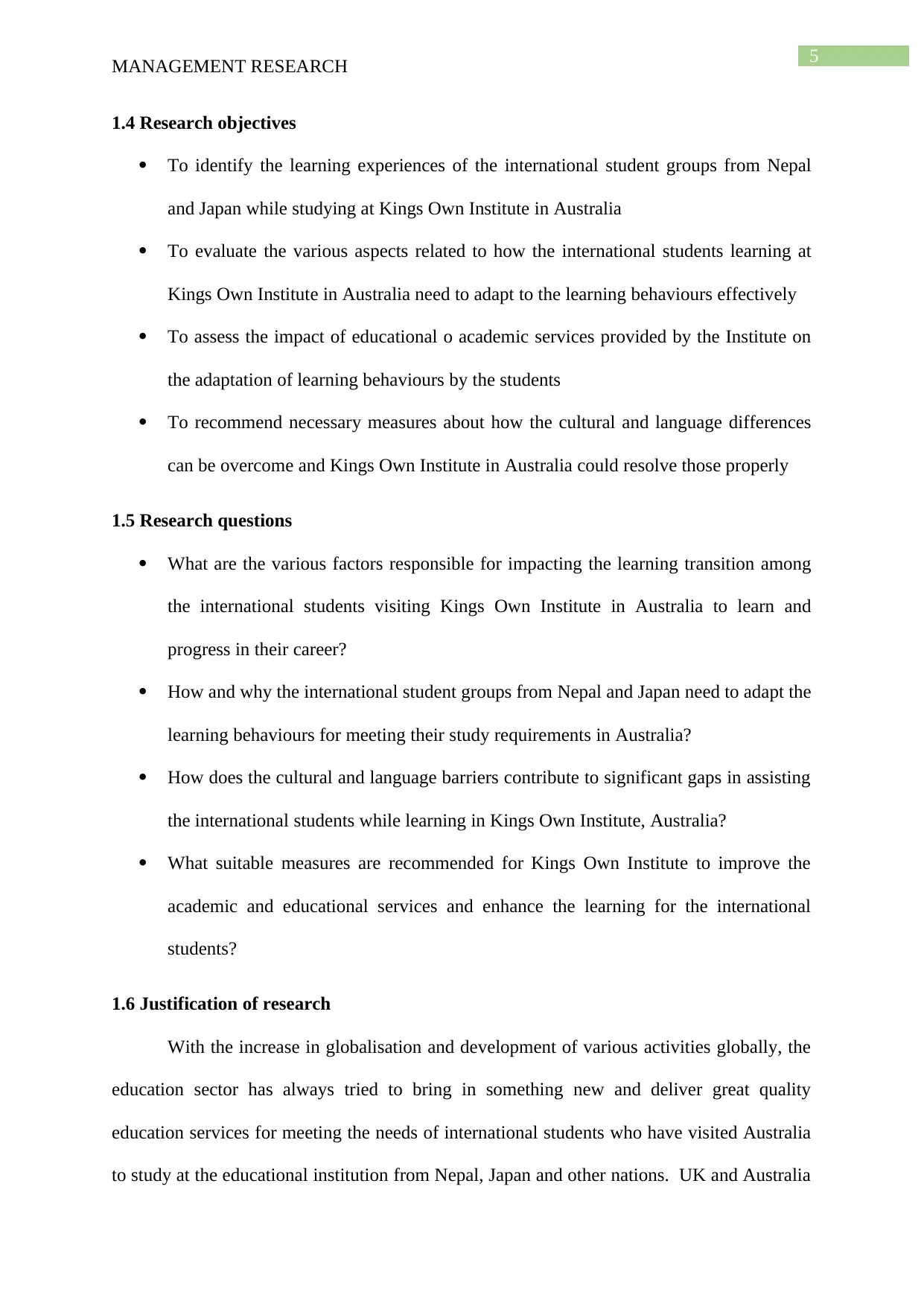
5
MANAGEMENT RESEARCH
1.4 Research objectives
To identify the learning experiences of the international student groups from Nepal
and Japan while studying at Kings Own Institute in Australia
To evaluate the various aspects related to how the international students learning at
Kings Own Institute in Australia need to adapt to the learning behaviours effectively
To assess the impact of educational o academic services provided by the Institute on
the adaptation of learning behaviours by the students
To recommend necessary measures about how the cultural and language differences
can be overcome and Kings Own Institute in Australia could resolve those properly
1.5 Research questions
What are the various factors responsible for impacting the learning transition among
the international students visiting Kings Own Institute in Australia to learn and
progress in their career?
How and why the international student groups from Nepal and Japan need to adapt the
learning behaviours for meeting their study requirements in Australia?
How does the cultural and language barriers contribute to significant gaps in assisting
the international students while learning in Kings Own Institute, Australia?
What suitable measures are recommended for Kings Own Institute to improve the
academic and educational services and enhance the learning for the international
students?
1.6 Justification of research
With the increase in globalisation and development of various activities globally, the
education sector has always tried to bring in something new and deliver great quality
education services for meeting the needs of international students who have visited Australia
to study at the educational institution from Nepal, Japan and other nations. UK and Australia
MANAGEMENT RESEARCH
1.4 Research objectives
To identify the learning experiences of the international student groups from Nepal
and Japan while studying at Kings Own Institute in Australia
To evaluate the various aspects related to how the international students learning at
Kings Own Institute in Australia need to adapt to the learning behaviours effectively
To assess the impact of educational o academic services provided by the Institute on
the adaptation of learning behaviours by the students
To recommend necessary measures about how the cultural and language differences
can be overcome and Kings Own Institute in Australia could resolve those properly
1.5 Research questions
What are the various factors responsible for impacting the learning transition among
the international students visiting Kings Own Institute in Australia to learn and
progress in their career?
How and why the international student groups from Nepal and Japan need to adapt the
learning behaviours for meeting their study requirements in Australia?
How does the cultural and language barriers contribute to significant gaps in assisting
the international students while learning in Kings Own Institute, Australia?
What suitable measures are recommended for Kings Own Institute to improve the
academic and educational services and enhance the learning for the international
students?
1.6 Justification of research
With the increase in globalisation and development of various activities globally, the
education sector has always tried to bring in something new and deliver great quality
education services for meeting the needs of international students who have visited Australia
to study at the educational institution from Nepal, Japan and other nations. UK and Australia
⊘ This is a preview!⊘
Do you want full access?
Subscribe today to unlock all pages.

Trusted by 1+ million students worldwide
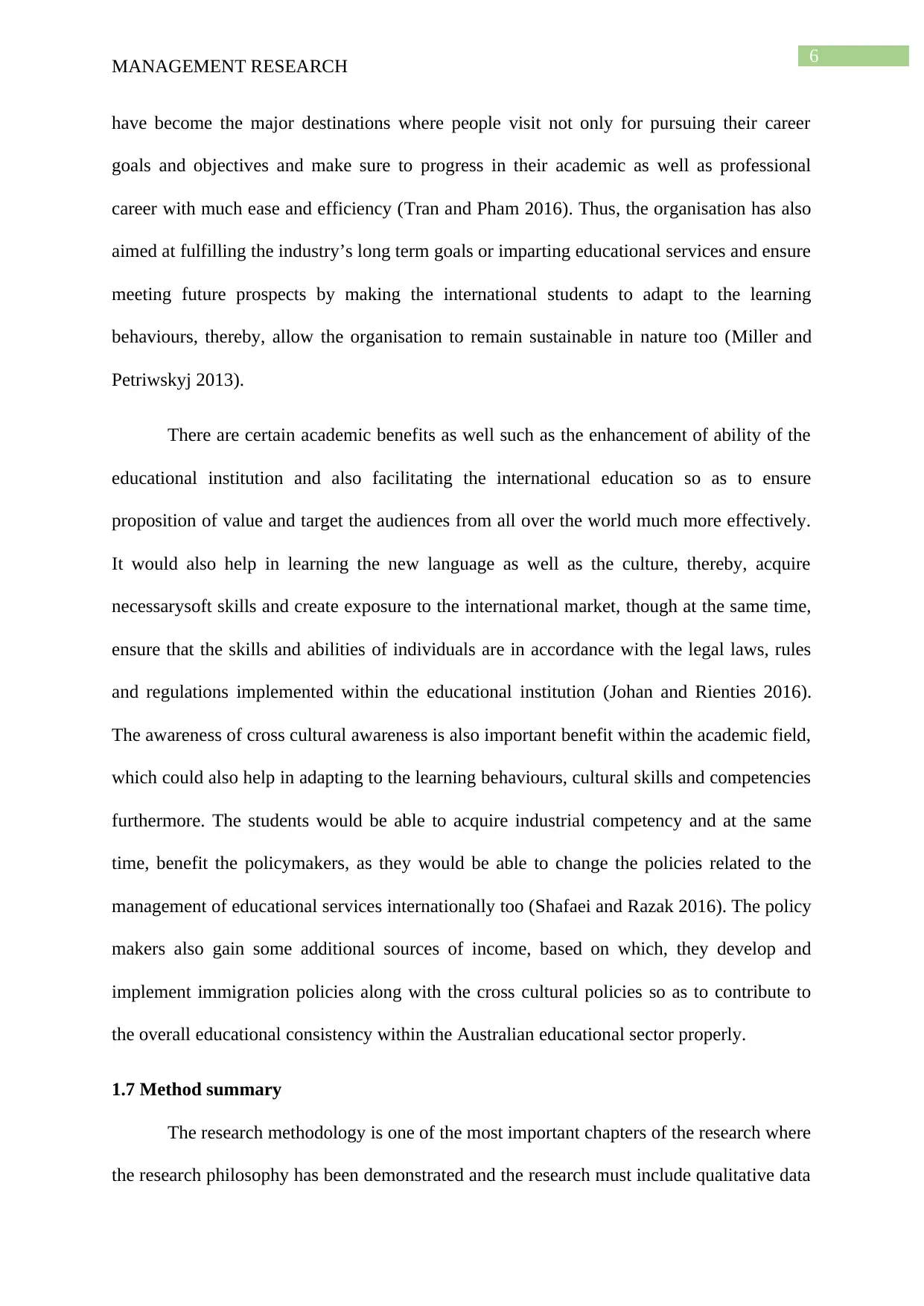
6
MANAGEMENT RESEARCH
have become the major destinations where people visit not only for pursuing their career
goals and objectives and make sure to progress in their academic as well as professional
career with much ease and efficiency (Tran and Pham 2016). Thus, the organisation has also
aimed at fulfilling the industry’s long term goals or imparting educational services and ensure
meeting future prospects by making the international students to adapt to the learning
behaviours, thereby, allow the organisation to remain sustainable in nature too (Miller and
Petriwskyj 2013).
There are certain academic benefits as well such as the enhancement of ability of the
educational institution and also facilitating the international education so as to ensure
proposition of value and target the audiences from all over the world much more effectively.
It would also help in learning the new language as well as the culture, thereby, acquire
necessarysoft skills and create exposure to the international market, though at the same time,
ensure that the skills and abilities of individuals are in accordance with the legal laws, rules
and regulations implemented within the educational institution (Johan and Rienties 2016).
The awareness of cross cultural awareness is also important benefit within the academic field,
which could also help in adapting to the learning behaviours, cultural skills and competencies
furthermore. The students would be able to acquire industrial competency and at the same
time, benefit the policymakers, as they would be able to change the policies related to the
management of educational services internationally too (Shafaei and Razak 2016). The policy
makers also gain some additional sources of income, based on which, they develop and
implement immigration policies along with the cross cultural policies so as to contribute to
the overall educational consistency within the Australian educational sector properly.
1.7 Method summary
The research methodology is one of the most important chapters of the research where
the research philosophy has been demonstrated and the research must include qualitative data
MANAGEMENT RESEARCH
have become the major destinations where people visit not only for pursuing their career
goals and objectives and make sure to progress in their academic as well as professional
career with much ease and efficiency (Tran and Pham 2016). Thus, the organisation has also
aimed at fulfilling the industry’s long term goals or imparting educational services and ensure
meeting future prospects by making the international students to adapt to the learning
behaviours, thereby, allow the organisation to remain sustainable in nature too (Miller and
Petriwskyj 2013).
There are certain academic benefits as well such as the enhancement of ability of the
educational institution and also facilitating the international education so as to ensure
proposition of value and target the audiences from all over the world much more effectively.
It would also help in learning the new language as well as the culture, thereby, acquire
necessarysoft skills and create exposure to the international market, though at the same time,
ensure that the skills and abilities of individuals are in accordance with the legal laws, rules
and regulations implemented within the educational institution (Johan and Rienties 2016).
The awareness of cross cultural awareness is also important benefit within the academic field,
which could also help in adapting to the learning behaviours, cultural skills and competencies
furthermore. The students would be able to acquire industrial competency and at the same
time, benefit the policymakers, as they would be able to change the policies related to the
management of educational services internationally too (Shafaei and Razak 2016). The policy
makers also gain some additional sources of income, based on which, they develop and
implement immigration policies along with the cross cultural policies so as to contribute to
the overall educational consistency within the Australian educational sector properly.
1.7 Method summary
The research methodology is one of the most important chapters of the research where
the research philosophy has been demonstrated and the research must include qualitative data
Paraphrase This Document
Need a fresh take? Get an instant paraphrase of this document with our AI Paraphraser
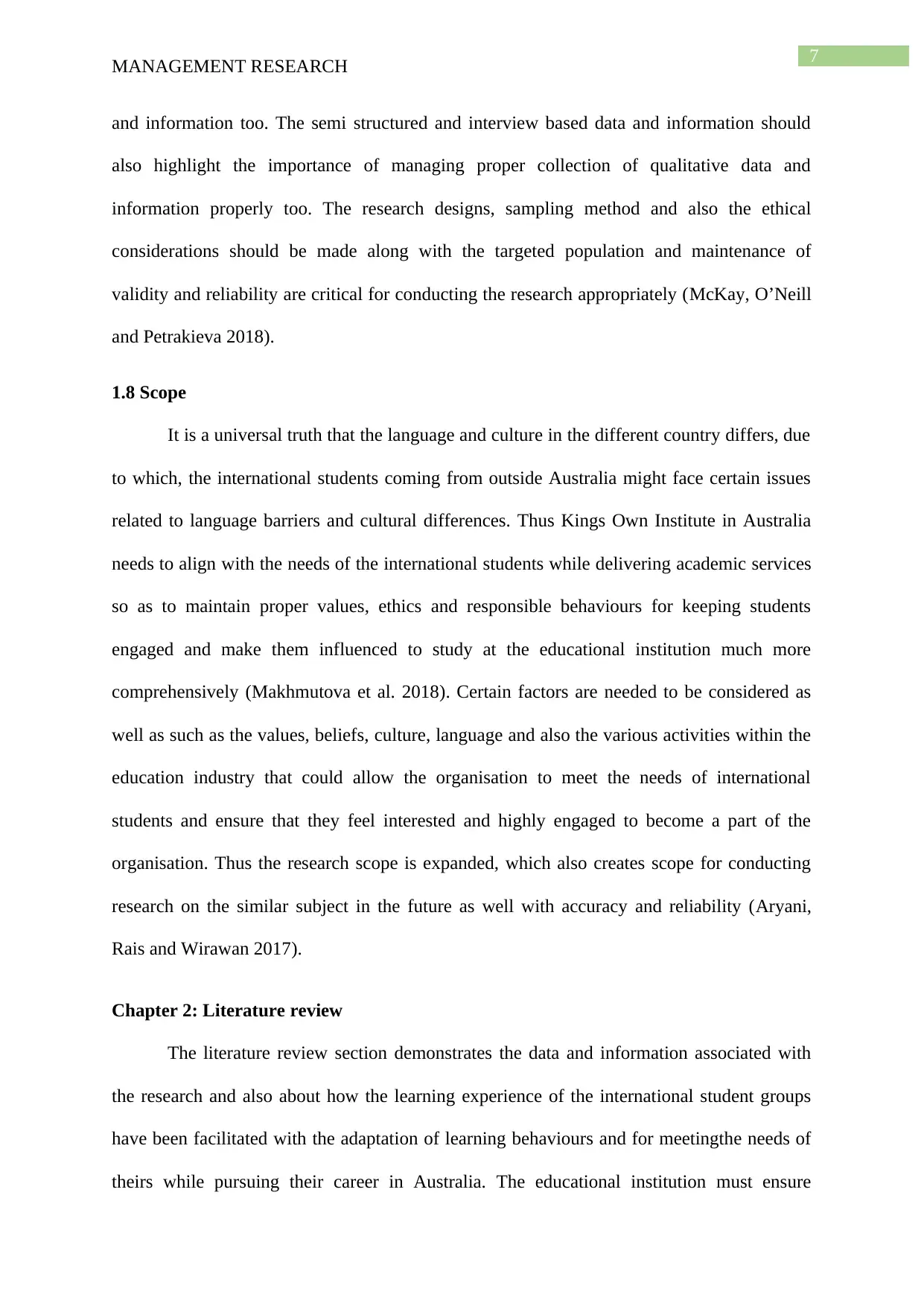
7
MANAGEMENT RESEARCH
and information too. The semi structured and interview based data and information should
also highlight the importance of managing proper collection of qualitative data and
information properly too. The research designs, sampling method and also the ethical
considerations should be made along with the targeted population and maintenance of
validity and reliability are critical for conducting the research appropriately (McKay, O’Neill
and Petrakieva 2018).
1.8 Scope
It is a universal truth that the language and culture in the different country differs, due
to which, the international students coming from outside Australia might face certain issues
related to language barriers and cultural differences. Thus Kings Own Institute in Australia
needs to align with the needs of the international students while delivering academic services
so as to maintain proper values, ethics and responsible behaviours for keeping students
engaged and make them influenced to study at the educational institution much more
comprehensively (Makhmutova et al. 2018). Certain factors are needed to be considered as
well as such as the values, beliefs, culture, language and also the various activities within the
education industry that could allow the organisation to meet the needs of international
students and ensure that they feel interested and highly engaged to become a part of the
organisation. Thus the research scope is expanded, which also creates scope for conducting
research on the similar subject in the future as well with accuracy and reliability (Aryani,
Rais and Wirawan 2017).
Chapter 2: Literature review
The literature review section demonstrates the data and information associated with
the research and also about how the learning experience of the international student groups
have been facilitated with the adaptation of learning behaviours and for meetingthe needs of
theirs while pursuing their career in Australia. The educational institution must ensure
MANAGEMENT RESEARCH
and information too. The semi structured and interview based data and information should
also highlight the importance of managing proper collection of qualitative data and
information properly too. The research designs, sampling method and also the ethical
considerations should be made along with the targeted population and maintenance of
validity and reliability are critical for conducting the research appropriately (McKay, O’Neill
and Petrakieva 2018).
1.8 Scope
It is a universal truth that the language and culture in the different country differs, due
to which, the international students coming from outside Australia might face certain issues
related to language barriers and cultural differences. Thus Kings Own Institute in Australia
needs to align with the needs of the international students while delivering academic services
so as to maintain proper values, ethics and responsible behaviours for keeping students
engaged and make them influenced to study at the educational institution much more
comprehensively (Makhmutova et al. 2018). Certain factors are needed to be considered as
well as such as the values, beliefs, culture, language and also the various activities within the
education industry that could allow the organisation to meet the needs of international
students and ensure that they feel interested and highly engaged to become a part of the
organisation. Thus the research scope is expanded, which also creates scope for conducting
research on the similar subject in the future as well with accuracy and reliability (Aryani,
Rais and Wirawan 2017).
Chapter 2: Literature review
The literature review section demonstrates the data and information associated with
the research and also about how the learning experience of the international student groups
have been facilitated with the adaptation of learning behaviours and for meetingthe needs of
theirs while pursuing their career in Australia. The educational institution must ensure
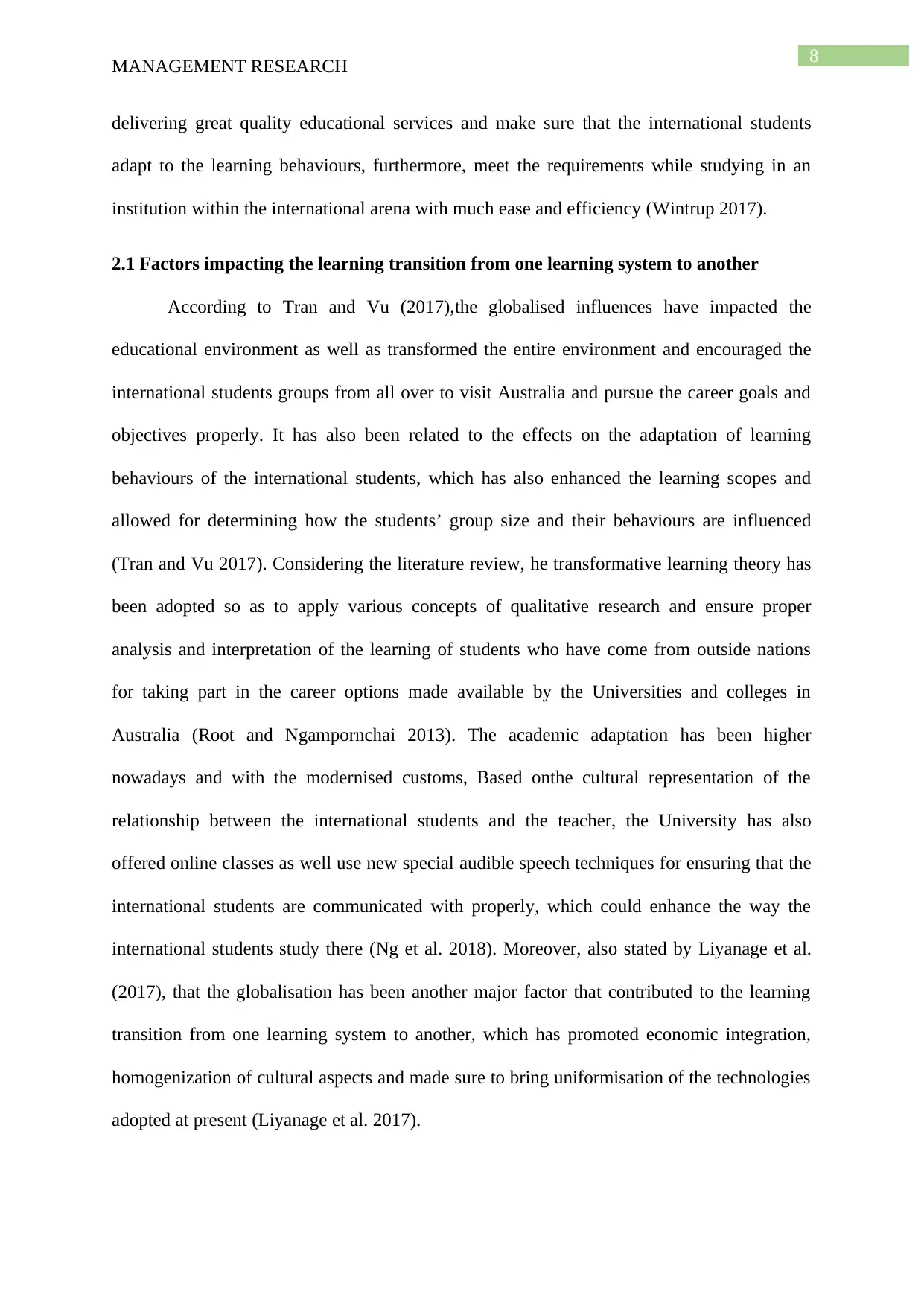
8
MANAGEMENT RESEARCH
delivering great quality educational services and make sure that the international students
adapt to the learning behaviours, furthermore, meet the requirements while studying in an
institution within the international arena with much ease and efficiency (Wintrup 2017).
2.1 Factors impacting the learning transition from one learning system to another
According to Tran and Vu (2017),the globalised influences have impacted the
educational environment as well as transformed the entire environment and encouraged the
international students groups from all over to visit Australia and pursue the career goals and
objectives properly. It has also been related to the effects on the adaptation of learning
behaviours of the international students, which has also enhanced the learning scopes and
allowed for determining how the students’ group size and their behaviours are influenced
(Tran and Vu 2017). Considering the literature review, he transformative learning theory has
been adopted so as to apply various concepts of qualitative research and ensure proper
analysis and interpretation of the learning of students who have come from outside nations
for taking part in the career options made available by the Universities and colleges in
Australia (Root and Ngampornchai 2013). The academic adaptation has been higher
nowadays and with the modernised customs, Based onthe cultural representation of the
relationship between the international students and the teacher, the University has also
offered online classes as well use new special audible speech techniques for ensuring that the
international students are communicated with properly, which could enhance the way the
international students study there (Ng et al. 2018). Moreover, also stated by Liyanage et al.
(2017), that the globalisation has been another major factor that contributed to the learning
transition from one learning system to another, which has promoted economic integration,
homogenization of cultural aspects and made sure to bring uniformisation of the technologies
adopted at present (Liyanage et al. 2017).
MANAGEMENT RESEARCH
delivering great quality educational services and make sure that the international students
adapt to the learning behaviours, furthermore, meet the requirements while studying in an
institution within the international arena with much ease and efficiency (Wintrup 2017).
2.1 Factors impacting the learning transition from one learning system to another
According to Tran and Vu (2017),the globalised influences have impacted the
educational environment as well as transformed the entire environment and encouraged the
international students groups from all over to visit Australia and pursue the career goals and
objectives properly. It has also been related to the effects on the adaptation of learning
behaviours of the international students, which has also enhanced the learning scopes and
allowed for determining how the students’ group size and their behaviours are influenced
(Tran and Vu 2017). Considering the literature review, he transformative learning theory has
been adopted so as to apply various concepts of qualitative research and ensure proper
analysis and interpretation of the learning of students who have come from outside nations
for taking part in the career options made available by the Universities and colleges in
Australia (Root and Ngampornchai 2013). The academic adaptation has been higher
nowadays and with the modernised customs, Based onthe cultural representation of the
relationship between the international students and the teacher, the University has also
offered online classes as well use new special audible speech techniques for ensuring that the
international students are communicated with properly, which could enhance the way the
international students study there (Ng et al. 2018). Moreover, also stated by Liyanage et al.
(2017), that the globalisation has been another major factor that contributed to the learning
transition from one learning system to another, which has promoted economic integration,
homogenization of cultural aspects and made sure to bring uniformisation of the technologies
adopted at present (Liyanage et al. 2017).
⊘ This is a preview!⊘
Do you want full access?
Subscribe today to unlock all pages.

Trusted by 1+ million students worldwide
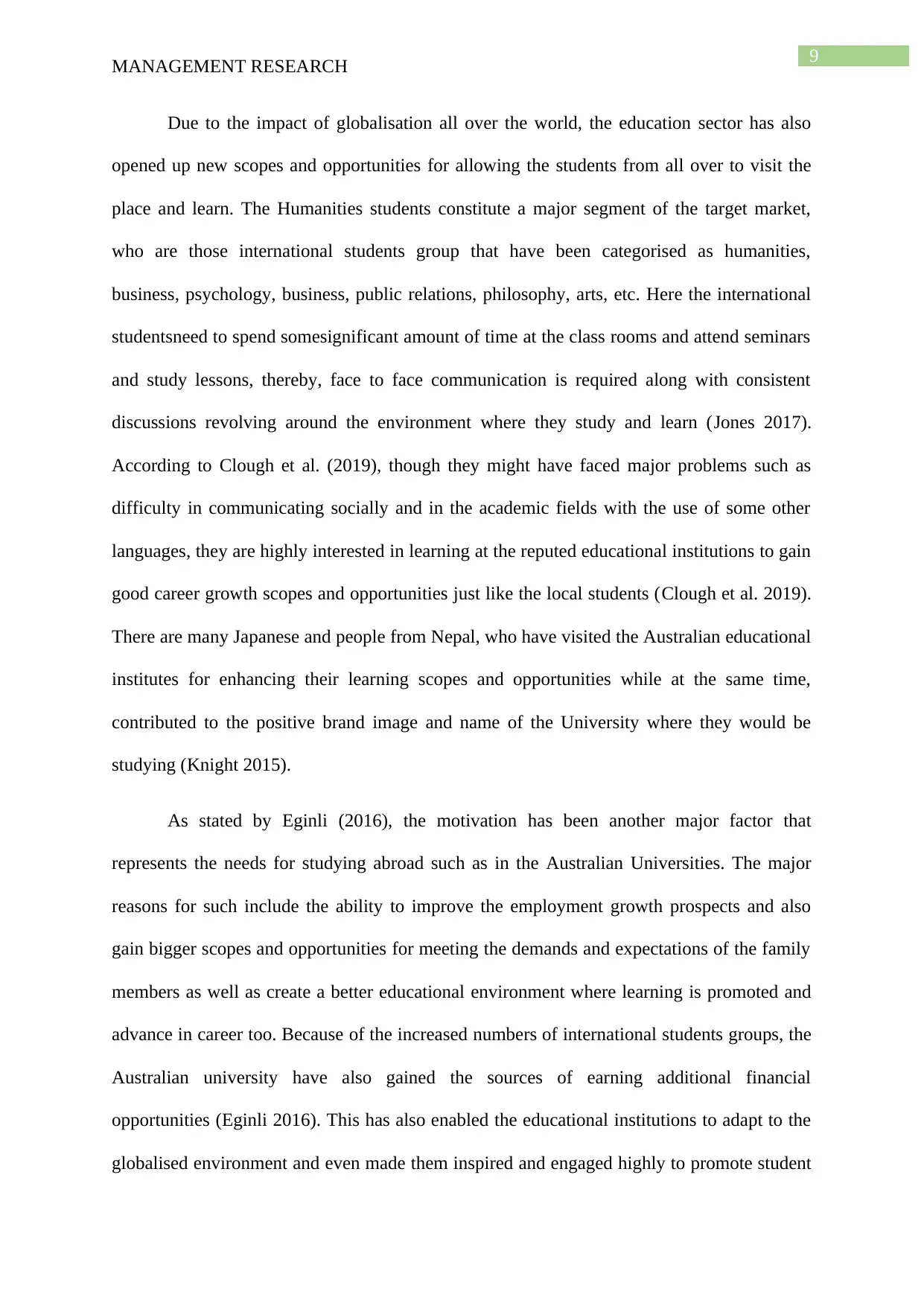
9
MANAGEMENT RESEARCH
Due to the impact of globalisation all over the world, the education sector has also
opened up new scopes and opportunities for allowing the students from all over to visit the
place and learn. The Humanities students constitute a major segment of the target market,
who are those international students group that have been categorised as humanities,
business, psychology, business, public relations, philosophy, arts, etc. Here the international
studentsneed to spend somesignificant amount of time at the class rooms and attend seminars
and study lessons, thereby, face to face communication is required along with consistent
discussions revolving around the environment where they study and learn (Jones 2017).
According to Clough et al. (2019), though they might have faced major problems such as
difficulty in communicating socially and in the academic fields with the use of some other
languages, they are highly interested in learning at the reputed educational institutions to gain
good career growth scopes and opportunities just like the local students (Clough et al. 2019).
There are many Japanese and people from Nepal, who have visited the Australian educational
institutes for enhancing their learning scopes and opportunities while at the same time,
contributed to the positive brand image and name of the University where they would be
studying (Knight 2015).
As stated by Eginli (2016), the motivation has been another major factor that
represents the needs for studying abroad such as in the Australian Universities. The major
reasons for such include the ability to improve the employment growth prospects and also
gain bigger scopes and opportunities for meeting the demands and expectations of the family
members as well as create a better educational environment where learning is promoted and
advance in career too. Because of the increased numbers of international students groups, the
Australian university have also gained the sources of earning additional financial
opportunities (Eginli 2016). This has also enabled the educational institutions to adapt to the
globalised environment and even made them inspired and engaged highly to promote student
MANAGEMENT RESEARCH
Due to the impact of globalisation all over the world, the education sector has also
opened up new scopes and opportunities for allowing the students from all over to visit the
place and learn. The Humanities students constitute a major segment of the target market,
who are those international students group that have been categorised as humanities,
business, psychology, business, public relations, philosophy, arts, etc. Here the international
studentsneed to spend somesignificant amount of time at the class rooms and attend seminars
and study lessons, thereby, face to face communication is required along with consistent
discussions revolving around the environment where they study and learn (Jones 2017).
According to Clough et al. (2019), though they might have faced major problems such as
difficulty in communicating socially and in the academic fields with the use of some other
languages, they are highly interested in learning at the reputed educational institutions to gain
good career growth scopes and opportunities just like the local students (Clough et al. 2019).
There are many Japanese and people from Nepal, who have visited the Australian educational
institutes for enhancing their learning scopes and opportunities while at the same time,
contributed to the positive brand image and name of the University where they would be
studying (Knight 2015).
As stated by Eginli (2016), the motivation has been another major factor that
represents the needs for studying abroad such as in the Australian Universities. The major
reasons for such include the ability to improve the employment growth prospects and also
gain bigger scopes and opportunities for meeting the demands and expectations of the family
members as well as create a better educational environment where learning is promoted and
advance in career too. Because of the increased numbers of international students groups, the
Australian university have also gained the sources of earning additional financial
opportunities (Eginli 2016). This has also enabled the educational institutions to adapt to the
globalised environment and even made them inspired and engaged highly to promote student
Paraphrase This Document
Need a fresh take? Get an instant paraphrase of this document with our AI Paraphraser
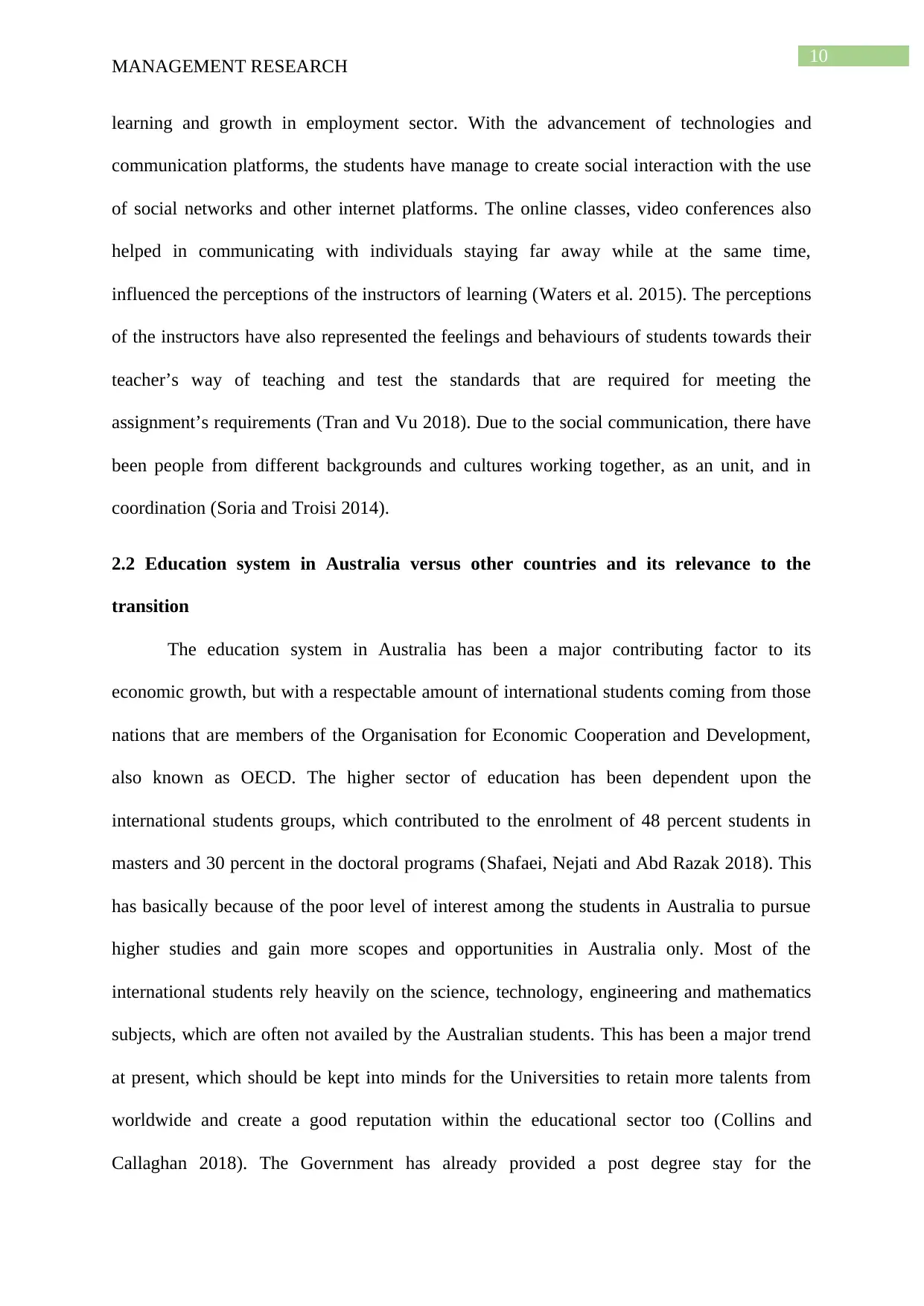
10
MANAGEMENT RESEARCH
learning and growth in employment sector. With the advancement of technologies and
communication platforms, the students have manage to create social interaction with the use
of social networks and other internet platforms. The online classes, video conferences also
helped in communicating with individuals staying far away while at the same time,
influenced the perceptions of the instructors of learning (Waters et al. 2015). The perceptions
of the instructors have also represented the feelings and behaviours of students towards their
teacher’s way of teaching and test the standards that are required for meeting the
assignment’s requirements (Tran and Vu 2018). Due to the social communication, there have
been people from different backgrounds and cultures working together, as an unit, and in
coordination (Soria and Troisi 2014).
2.2 Education system in Australia versus other countries and its relevance to the
transition
The education system in Australia has been a major contributing factor to its
economic growth, but with a respectable amount of international students coming from those
nations that are members of the Organisation for Economic Cooperation and Development,
also known as OECD. The higher sector of education has been dependent upon the
international students groups, which contributed to the enrolment of 48 percent students in
masters and 30 percent in the doctoral programs (Shafaei, Nejati and Abd Razak 2018). This
has basically because of the poor level of interest among the students in Australia to pursue
higher studies and gain more scopes and opportunities in Australia only. Most of the
international students rely heavily on the science, technology, engineering and mathematics
subjects, which are often not availed by the Australian students. This has been a major trend
at present, which should be kept into minds for the Universities to retain more talents from
worldwide and create a good reputation within the educational sector too (Collins and
Callaghan 2018). The Government has already provided a post degree stay for the
MANAGEMENT RESEARCH
learning and growth in employment sector. With the advancement of technologies and
communication platforms, the students have manage to create social interaction with the use
of social networks and other internet platforms. The online classes, video conferences also
helped in communicating with individuals staying far away while at the same time,
influenced the perceptions of the instructors of learning (Waters et al. 2015). The perceptions
of the instructors have also represented the feelings and behaviours of students towards their
teacher’s way of teaching and test the standards that are required for meeting the
assignment’s requirements (Tran and Vu 2018). Due to the social communication, there have
been people from different backgrounds and cultures working together, as an unit, and in
coordination (Soria and Troisi 2014).
2.2 Education system in Australia versus other countries and its relevance to the
transition
The education system in Australia has been a major contributing factor to its
economic growth, but with a respectable amount of international students coming from those
nations that are members of the Organisation for Economic Cooperation and Development,
also known as OECD. The higher sector of education has been dependent upon the
international students groups, which contributed to the enrolment of 48 percent students in
masters and 30 percent in the doctoral programs (Shafaei, Nejati and Abd Razak 2018). This
has basically because of the poor level of interest among the students in Australia to pursue
higher studies and gain more scopes and opportunities in Australia only. Most of the
international students rely heavily on the science, technology, engineering and mathematics
subjects, which are often not availed by the Australian students. This has been a major trend
at present, which should be kept into minds for the Universities to retain more talents from
worldwide and create a good reputation within the educational sector too (Collins and
Callaghan 2018). The Government has already provided a post degree stay for the
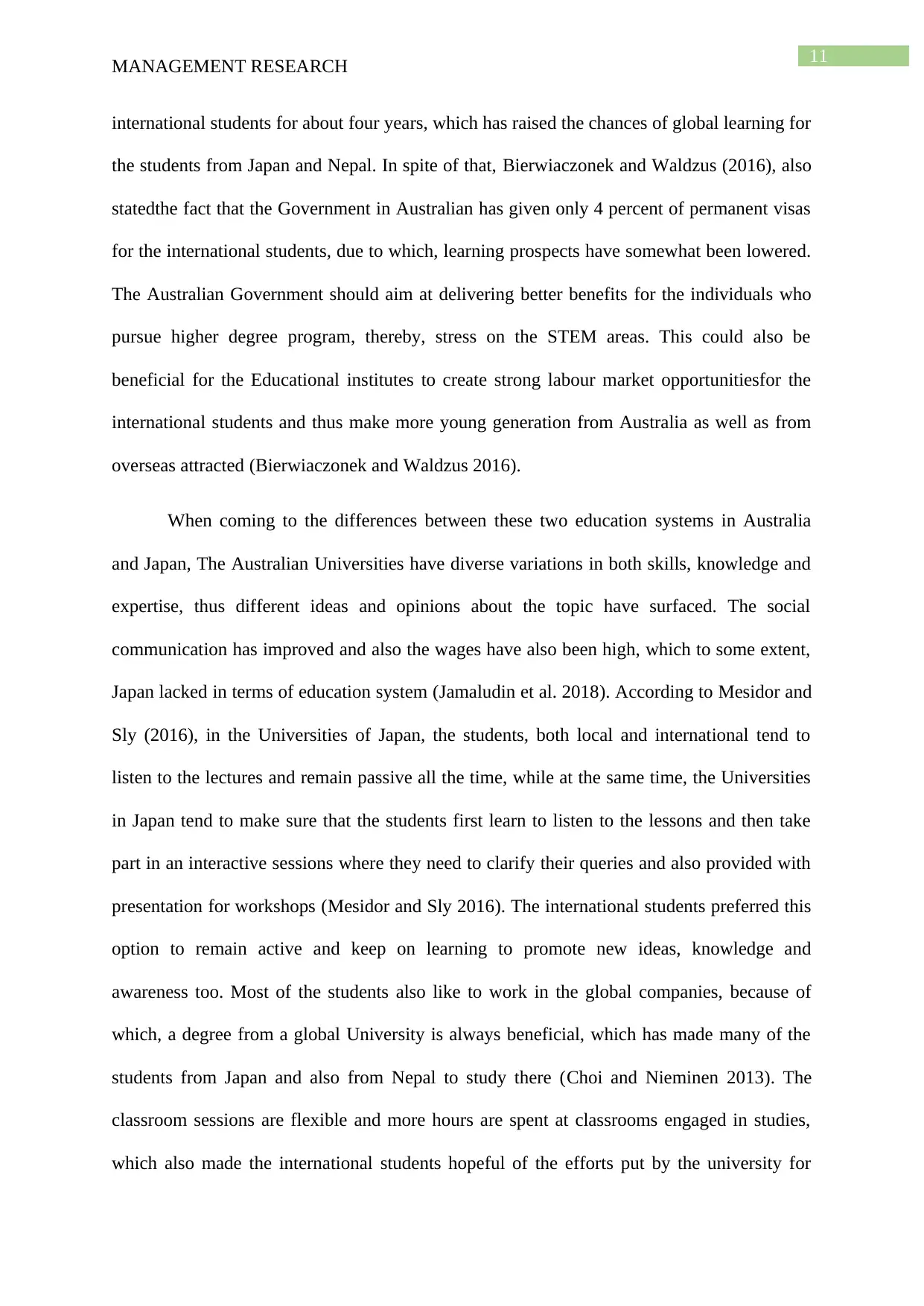
11
MANAGEMENT RESEARCH
international students for about four years, which has raised the chances of global learning for
the students from Japan and Nepal. In spite of that, Bierwiaczonek and Waldzus (2016), also
statedthe fact that the Government in Australian has given only 4 percent of permanent visas
for the international students, due to which, learning prospects have somewhat been lowered.
The Australian Government should aim at delivering better benefits for the individuals who
pursue higher degree program, thereby, stress on the STEM areas. This could also be
beneficial for the Educational institutes to create strong labour market opportunitiesfor the
international students and thus make more young generation from Australia as well as from
overseas attracted (Bierwiaczonek and Waldzus 2016).
When coming to the differences between these two education systems in Australia
and Japan, The Australian Universities have diverse variations in both skills, knowledge and
expertise, thus different ideas and opinions about the topic have surfaced. The social
communication has improved and also the wages have also been high, which to some extent,
Japan lacked in terms of education system (Jamaludin et al. 2018). According to Mesidor and
Sly (2016), in the Universities of Japan, the students, both local and international tend to
listen to the lectures and remain passive all the time, while at the same time, the Universities
in Japan tend to make sure that the students first learn to listen to the lessons and then take
part in an interactive sessions where they need to clarify their queries and also provided with
presentation for workshops (Mesidor and Sly 2016). The international students preferred this
option to remain active and keep on learning to promote new ideas, knowledge and
awareness too. Most of the students also like to work in the global companies, because of
which, a degree from a global University is always beneficial, which has made many of the
students from Japan and also from Nepal to study there (Choi and Nieminen 2013). The
classroom sessions are flexible and more hours are spent at classrooms engaged in studies,
which also made the international students hopeful of the efforts put by the university for
MANAGEMENT RESEARCH
international students for about four years, which has raised the chances of global learning for
the students from Japan and Nepal. In spite of that, Bierwiaczonek and Waldzus (2016), also
statedthe fact that the Government in Australian has given only 4 percent of permanent visas
for the international students, due to which, learning prospects have somewhat been lowered.
The Australian Government should aim at delivering better benefits for the individuals who
pursue higher degree program, thereby, stress on the STEM areas. This could also be
beneficial for the Educational institutes to create strong labour market opportunitiesfor the
international students and thus make more young generation from Australia as well as from
overseas attracted (Bierwiaczonek and Waldzus 2016).
When coming to the differences between these two education systems in Australia
and Japan, The Australian Universities have diverse variations in both skills, knowledge and
expertise, thus different ideas and opinions about the topic have surfaced. The social
communication has improved and also the wages have also been high, which to some extent,
Japan lacked in terms of education system (Jamaludin et al. 2018). According to Mesidor and
Sly (2016), in the Universities of Japan, the students, both local and international tend to
listen to the lectures and remain passive all the time, while at the same time, the Universities
in Japan tend to make sure that the students first learn to listen to the lessons and then take
part in an interactive sessions where they need to clarify their queries and also provided with
presentation for workshops (Mesidor and Sly 2016). The international students preferred this
option to remain active and keep on learning to promote new ideas, knowledge and
awareness too. Most of the students also like to work in the global companies, because of
which, a degree from a global University is always beneficial, which has made many of the
students from Japan and also from Nepal to study there (Choi and Nieminen 2013). The
classroom sessions are flexible and more hours are spent at classrooms engaged in studies,
which also made the international students hopeful of the efforts put by the university for
⊘ This is a preview!⊘
Do you want full access?
Subscribe today to unlock all pages.

Trusted by 1+ million students worldwide
1 out of 32
Related Documents
Your All-in-One AI-Powered Toolkit for Academic Success.
+13062052269
info@desklib.com
Available 24*7 on WhatsApp / Email
![[object Object]](/_next/static/media/star-bottom.7253800d.svg)
Unlock your academic potential
Copyright © 2020–2026 A2Z Services. All Rights Reserved. Developed and managed by ZUCOL.





